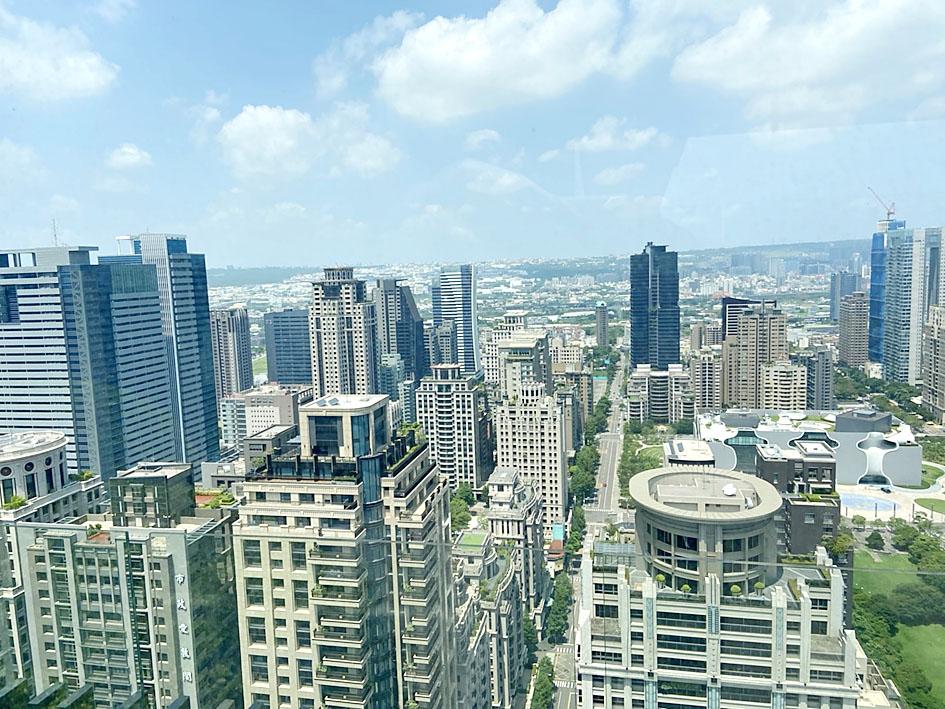Developers and builders last quarter introduced NT$349.5 billion (US$12.09 billion) of presale and new housing to the market, an 8.7 percent quarterly decline, while benefiting from a modest increase in selling prices and sales rates, a survey by Cathay Real Estate Development Co (國泰建設) showed yesterday.
A recovery was previously evident in commercial and land deals, but the data now supports that the upward trend has spread to residential properties, especially presale projects.
“The local property market has seen signs of recovery judging by the price hikes and stable volume,” the report said.

Photo: Hsu Yi-ping, Taipei Times
The upturn came in line with property prices in the UK, the US and Germany, since authorities in those states cut interest rates to support their economies, it said.
However, uncertainty lingers regarding the global economy, as COVID-19 infections are spiking in Europe and the US — although the world has better adapted to the pandemic, it added.
Presale projects and new housing nationwide averaged NT$303,000 per ping (3.3m2) between July and September, rising 1.98 percent from the second quarter, it said.
The 30-day sales rate gained 1.17 percentage points to 12.2 percent, while the transaction index picked up 25.98 percent to 368.03, it said, adding that price concession rates rose 1.13 percentage points to 14.42 percent.
By regional breakdown, property prices in Taipei grew fastest at 5.06 percent to NT$865,300 per ping, although sales volume shrank 10 percent, it said, calling the trend stable, but meriting caution.
The situation in New Taipei City saw improvement on all fronts: The 30-day sales rate stood at 10.41 percent, selling prices rose 3.09 percent to NT$415,600 per ping and the transaction index climbed to 404.53, it said.
“The market in New Taipei City appears on course to overheat,” it said.
Properties in Taoyuan continued to benefit from enhanced infrastructure, notably the Taiwan Taoyuan International Airport Access MRT System that links the special municipality with Taipei and New Taipei City, it said.
Average housing prices in Taoyuan stood at NT$26,600 per ping, virtually flat from a quarter earlier, while the 30-day sales rate rose to 11.12 percent and the transaction index advanced to 463.74, it said.
Property prices in Taichung declined 6.5 percent to NT$256,800 per ping, but the 30-day sales rate rose to 13.28 percent and the transaction index increased to 441.15, it said.
In Tainan, presale and new housing prices increased 2.7 percent to NT$24,900 per ping, while prices edged up 0.82 percent in Kaohsiung to NT$239,000 per ping, it said.
Condo apartments priced at NT$13.96 million per unit were the quarter’s hot product, it said.

MULTIFACETED: A task force has analyzed possible scenarios and created responses to assist domestic industries in dealing with US tariffs, the economics minister said The Executive Yuan is tomorrow to announce countermeasures to US President Donald Trump’s planned reciprocal tariffs, although the details of the plan would not be made public until Monday next week, Minister of Economic Affairs J.W. Kuo (郭智輝) said yesterday. The Cabinet established an economic and trade task force in November last year to deal with US trade and tariff related issues, Kuo told reporters outside the legislature in Taipei. The task force has been analyzing and evaluating all kinds of scenarios to identify suitable responses and determine how best to assist domestic industries in managing the effects of Trump’s tariffs, he

TIGHT-LIPPED: UMC said it had no merger plans at the moment, after Nikkei Asia reported that the firm and GlobalFoundries were considering restarting merger talks United Microelectronics Corp (UMC, 聯電), the world’s No. 4 contract chipmaker, yesterday launched a new US$5 billion 12-inch chip factory in Singapore as part of its latest effort to diversify its manufacturing footprint amid growing geopolitical risks. The new factory, adjacent to UMC’s existing Singapore fab in the Pasir Res Wafer Fab Park, is scheduled to enter volume production next year, utilizing mature 22-nanometer and 28-nanometer process technologies, UMC said in a statement. The company plans to invest US$5 billion during the first phase of the new fab, which would have an installed capacity of 30,000 12-inch wafers per month, it said. The

Taiwan’s official purchasing managers’ index (PMI) last month rose 0.2 percentage points to 54.2, in a second consecutive month of expansion, thanks to front-loading demand intended to avoid potential US tariff hikes, the Chung-Hua Institution for Economic Research (CIER, 中華經濟研究院) said yesterday. While short-term demand appeared robust, uncertainties rose due to US President Donald Trump’s unpredictable trade policy, CIER president Lien Hsien-ming (連賢明) told a news conference in Taipei. Taiwan’s economy this year would be characterized by high-level fluctuations and the volatility would be wilder than most expect, Lien said Demand for electronics, particularly semiconductors, continues to benefit from US technology giants’ effort

‘SWASTICAR’: Tesla CEO Elon Musk’s close association with Donald Trump has prompted opponents to brand him a ‘Nazi’ and resulted in a dramatic drop in sales Demonstrators descended on Tesla Inc dealerships across the US, and in Europe and Canada on Saturday to protest company chief Elon Musk, who has amassed extraordinary power as a top adviser to US President Donald Trump. Waving signs with messages such as “Musk is stealing our money” and “Reclaim our country,” the protests largely took place peacefully following fiery episodes of vandalism on Tesla vehicles, dealerships and other facilities in recent weeks that US officials have denounced as terrorism. Hundreds rallied on Saturday outside the Tesla dealership in Manhattan. Some blasted Musk, the world’s richest man, while others demanded the shuttering of his